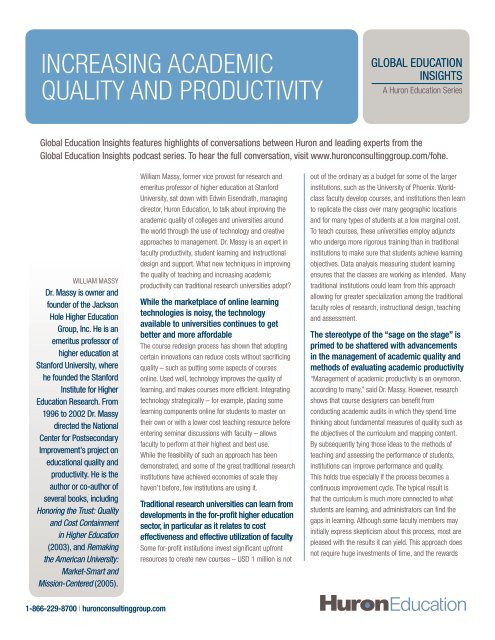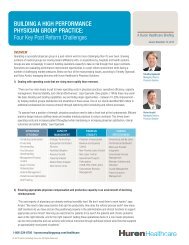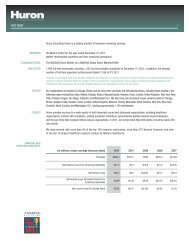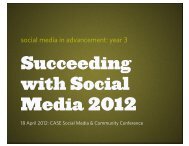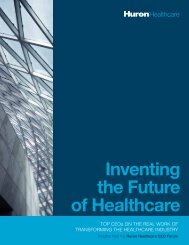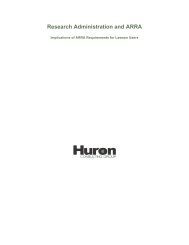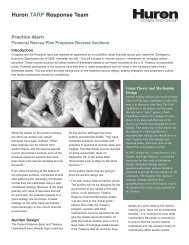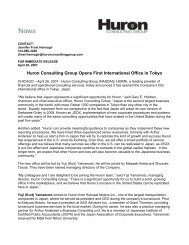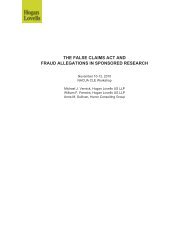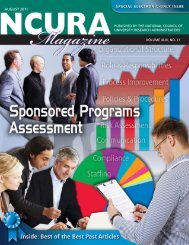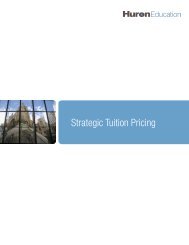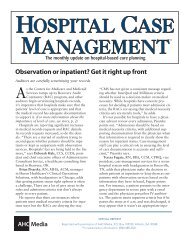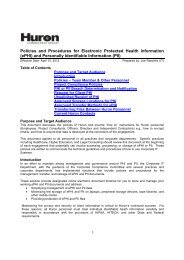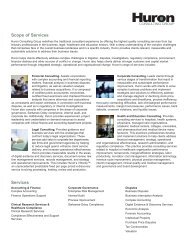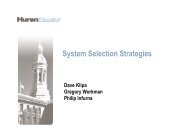increasing academic quality and productivity - Huron Consulting ...
increasing academic quality and productivity - Huron Consulting ...
increasing academic quality and productivity - Huron Consulting ...
Create successful ePaper yourself
Turn your PDF publications into a flip-book with our unique Google optimized e-Paper software.
INCREASING ACADEMIC<br />
QUALITY AND PRODUCTIVITY<br />
1-866-229-8700 | huronconsultinggroup.com<br />
GLOBAL EDUCATION<br />
INSIGHTS<br />
A <strong>Huron</strong> Education Series<br />
Global Education Insights features highlights of conversations between <strong>Huron</strong> <strong>and</strong> leading experts from the<br />
Global Education Insights podcast series. To hear the full conversation, visit www.huronconsultinggroup.com/fohe.<br />
WILLIAM MASSY<br />
Dr. Massy is owner <strong>and</strong><br />
founder of the Jackson<br />
Hole Higher Education<br />
Group, Inc. He is an<br />
emeritus professor of<br />
higher education at<br />
Stanford University, where<br />
he founded the Stanford<br />
Institute for Higher<br />
Education Research. From<br />
1996 to 2002 Dr. Massy<br />
directed the National<br />
Center for Postsecondary<br />
Improvement’s project on<br />
educational <strong>quality</strong> <strong>and</strong><br />
<strong>productivity</strong>. He is the<br />
author or co-author of<br />
several books, including<br />
Honoring the Trust: Quality<br />
<strong>and</strong> Cost Containment<br />
in Higher Education<br />
(2003), <strong>and</strong> Remaking<br />
the American University:<br />
Market-Smart <strong>and</strong><br />
Mission-Centered (2005).<br />
William Massy, former vice provost for research <strong>and</strong><br />
emeritus professor of higher education at Stanford<br />
University, sat down with Edwin Eisendrath, managing<br />
director, <strong>Huron</strong> Education, to talk about improving the<br />
<strong>academic</strong> <strong>quality</strong> of colleges <strong>and</strong> universities around<br />
the world through the use of technology <strong>and</strong> creative<br />
approaches to management. Dr. Massy is an expert in<br />
faculty <strong>productivity</strong>, student learning <strong>and</strong> instructional<br />
design <strong>and</strong> support. What new techniques in improving<br />
the <strong>quality</strong> of teaching <strong>and</strong> <strong>increasing</strong> <strong>academic</strong><br />
<strong>productivity</strong> can traditional research universities adopt?<br />
While the marketplace of online learning<br />
technologies is noisy, the technology<br />
available to universities continues to get<br />
better <strong>and</strong> more affordable<br />
The course redesign process has shown that adopting<br />
certain innovations can reduce costs without sacrificing<br />
<strong>quality</strong> – such as putting some aspects of courses<br />
online. Used well, technology improves the <strong>quality</strong> of<br />
learning, <strong>and</strong> makes courses more efficient. Integrating<br />
technology strategically – for example, placing some<br />
learning components online for students to master on<br />
their own or with a lower cost teaching resource before<br />
entering seminar discussions with faculty – allows<br />
faculty to perform at their highest <strong>and</strong> best use.<br />
While the feasibility of such an approach has been<br />
demonstrated, <strong>and</strong> some of the great traditional research<br />
institutions have achieved economies of scale they<br />
haven’t before, few institutions are using it.<br />
Traditional research universities can learn from<br />
developments in the for-profit higher education<br />
sector, in particular as it relates to cost<br />
effectiveness <strong>and</strong> effective utilization of faculty<br />
Some for-profit institutions invest significant upfront<br />
resources to create new courses – USD 1 million is not<br />
out of the ordinary as a budget for some of the larger<br />
institutions, such as the University of Phoenix. Worldclass<br />
faculty develop courses, <strong>and</strong> institutions then learn<br />
to replicate the class over many geographic locations<br />
<strong>and</strong> for many types of students at a low marginal cost.<br />
To teach courses, these universities employ adjuncts<br />
who undergo more rigorous training than in traditional<br />
institutions to make sure that students achieve learning<br />
objectives. Data analysis measuring student learning<br />
ensures that the classes are working as intended. Many<br />
traditional institutions could learn from this approach<br />
allowing for greater specialization among the traditional<br />
faculty roles of research, instructional design, teaching<br />
<strong>and</strong> assessment.<br />
The stereotype of the “sage on the stage” is<br />
primed to be shattered with advancements<br />
in the management of <strong>academic</strong> <strong>quality</strong> <strong>and</strong><br />
methods of evaluating <strong>academic</strong> <strong>productivity</strong><br />
“Management of <strong>academic</strong> <strong>productivity</strong> is an oxymoron,<br />
according to many,” said Dr. Massy. However, research<br />
shows that course designers can benefit from<br />
conducting <strong>academic</strong> audits in which they spend time<br />
thinking about fundamental measures of <strong>quality</strong> such as<br />
the objectives of the curriculum <strong>and</strong> mapping content.<br />
By subsequently tying those ideas to the methods of<br />
teaching <strong>and</strong> assessing the performance of students,<br />
institutions can improve performance <strong>and</strong> <strong>quality</strong>.<br />
This holds true especially if the process becomes a<br />
continuous improvement cycle. The typical result is<br />
that the curriculum is much more connected to what<br />
students are learning, <strong>and</strong> administrators can find the<br />
gaps in learning. Although some faculty members may<br />
initially express skepticism about this process, most are<br />
pleased with the results it can yield. This approach does<br />
not require huge investments of time, <strong>and</strong> the rewards
2<br />
INCREASING ACADEMIC QUALITY AND PRODUCTIVITY<br />
for both faculty <strong>and</strong> students are significant. Information that<br />
already resides in university systems can also assist in tracking<br />
<strong>productivity</strong> by assembling it into databases to monitor ongoing<br />
activities in departments.<br />
Does your university innovate as well as it could to enhance<br />
student experience, improve faculty <strong>productivity</strong>, <strong>and</strong> ensure<br />
operational efficiency? To continue the discussion, contact:<br />
Edwin Eisendrath<br />
eeisendrath@huronconsultinggroup.com<br />
P: (312) 880-0414<br />
James DeVaney<br />
jdevaney@huronconsultinggroup.com<br />
P: (202) 585-6817<br />
1-866-229-8700 | huronconsultinggroup.com<br />
© 2012 <strong>Huron</strong> <strong>Consulting</strong> Group Inc. All Rights Reserved.


